【原创】专题24含有情态动词的专项训练 100 题-2025中考英语二轮专题复习(答题技巧+题目分类与分层)
文档属性
| 名称 | 【原创】专题24含有情态动词的专项训练 100 题-2025中考英语二轮专题复习(答题技巧+题目分类与分层) | 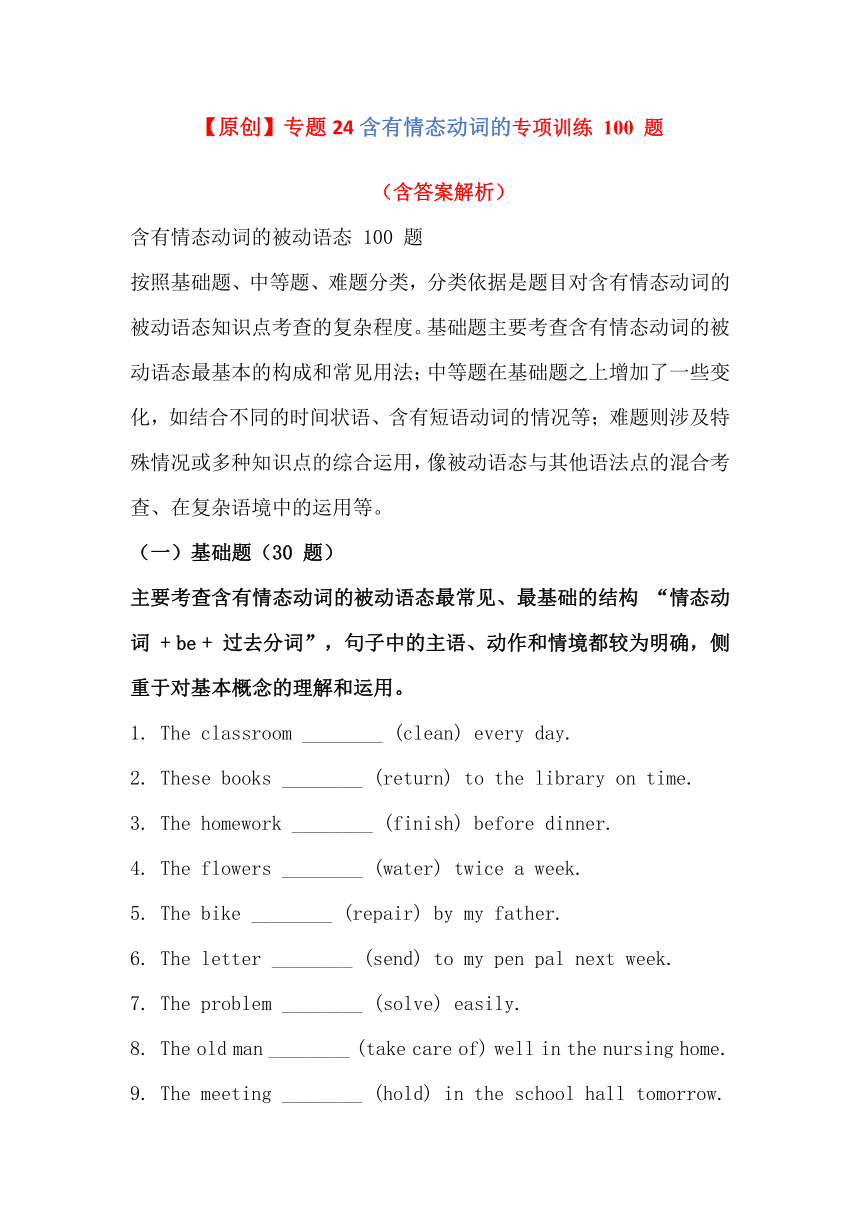 | |
| 格式 | docx | ||
| 文件大小 | 23.5KB | ||
| 资源类型 | 试卷 | ||
| 版本资源 | 人教新目标(Go for it)版 | ||
| 科目 | 英语 | ||
| 更新时间 | 2025-03-03 17:22:34 | ||
图片预览

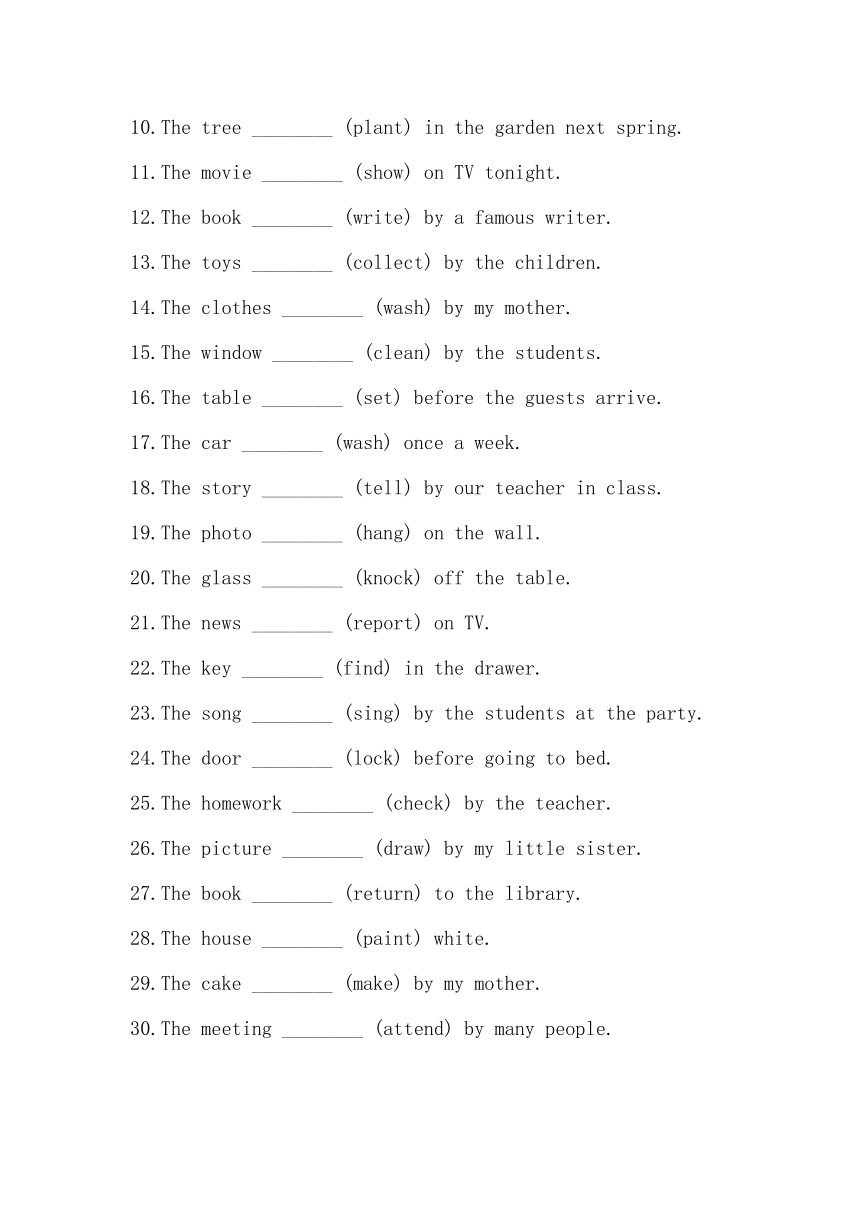
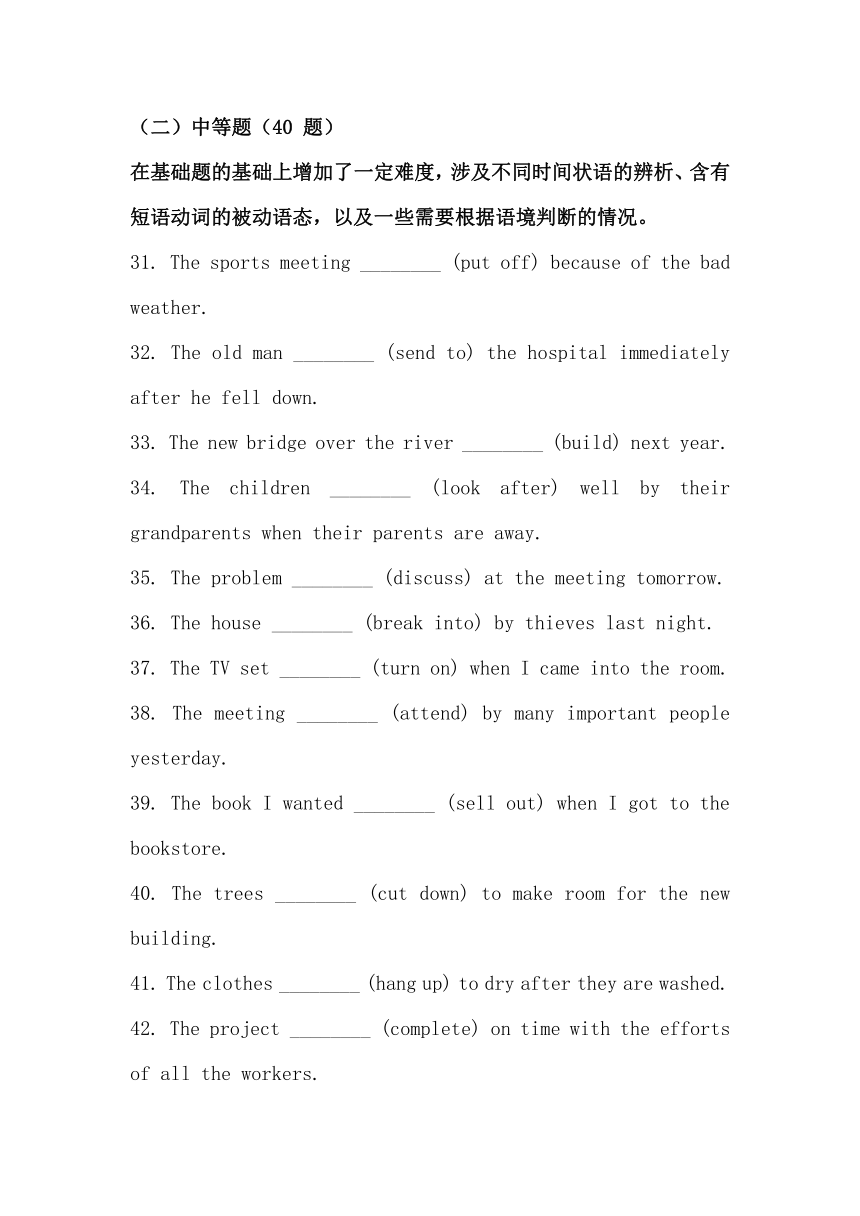
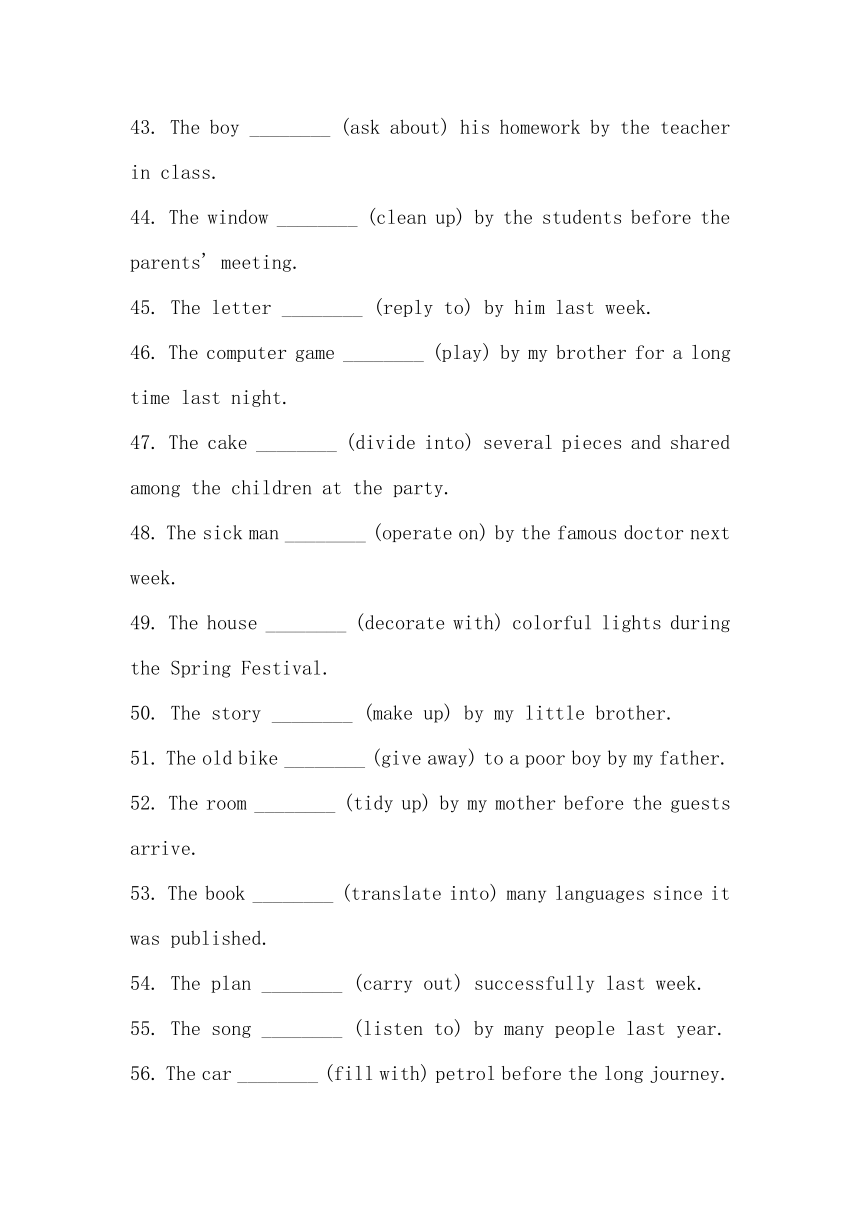
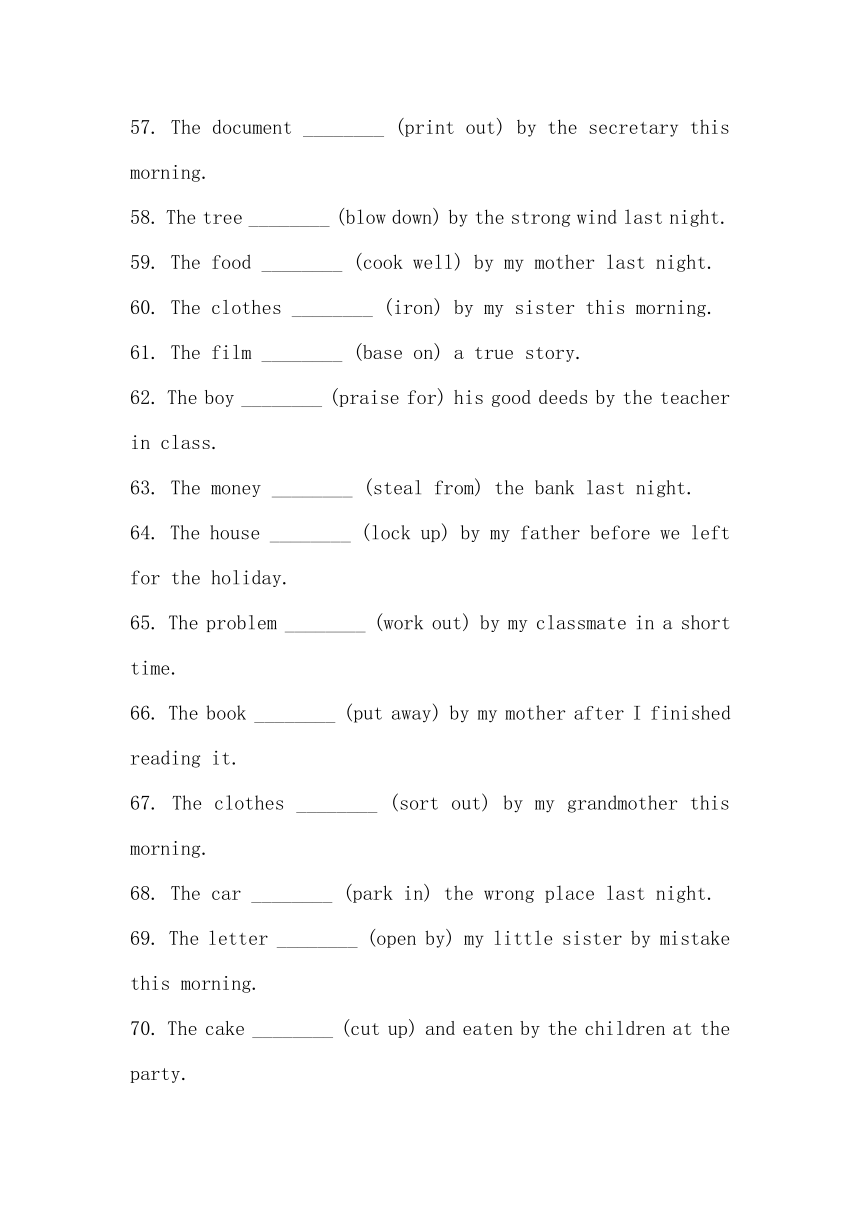
文档简介
【原创】专题24含有情态动词的专项训练 100 题
(含答案解析)
含有情态动词的被动语态 100 题
按照基础题、中等题、难题分类,分类依据是题目对含有情态动词的被动语态知识点考查的复杂程度。基础题主要考查含有情态动词的被动语态最基本的构成和常见用法;中等题在基础题之上增加了一些变化,如结合不同的时间状语、含有短语动词的情况等;难题则涉及特殊情况或多种知识点的综合运用,像被动语态与其他语法点的混合考查、在复杂语境中的运用等。
(一)基础题(30 题)
主要考查含有情态动词的被动语态最常见、最基础的结构 “情态动词 + be + 过去分词”,句子中的主语、动作和情境都较为明确,侧重于对基本概念的理解和运用。
The classroom ________ (clean) every day.
These books ________ (return) to the library on time.
The homework ________ (finish) before dinner.
The flowers ________ (water) twice a week.
The bike ________ (repair) by my father.
The letter ________ (send) to my pen pal next week.
The problem ________ (solve) easily.
The old man ________ (take care of) well in the nursing home.
The meeting ________ (hold) in the school hall tomorrow.
The tree ________ (plant) in the garden next spring.
The movie ________ (show) on TV tonight.
The book ________ (write) by a famous writer.
The toys ________ (collect) by the children.
The clothes ________ (wash) by my mother.
The window ________ (clean) by the students.
The table ________ (set) before the guests arrive.
The car ________ (wash) once a week.
The story ________ (tell) by our teacher in class.
The photo ________ (hang) on the wall.
The glass ________ (knock) off the table.
The news ________ (report) on TV.
The key ________ (find) in the drawer.
The song ________ (sing) by the students at the party.
The door ________ (lock) before going to bed.
The homework ________ (check) by the teacher.
The picture ________ (draw) by my little sister.
The book ________ (return) to the library.
The house ________ (paint) white.
The cake ________ (make) by my mother.
The meeting ________ (attend) by many people.
(二)中等题(40 题)
在基础题的基础上增加了一定难度,涉及不同时间状语的辨析、含有短语动词的被动语态,以及一些需要根据语境判断的情况。
31. The sports meeting ________ (put off) because of the bad weather.
32. The old man ________ (send to) the hospital immediately after he fell down.
33. The new bridge over the river ________ (build) next year.
34. The children ________ (look after) well by their grandparents when their parents are away.
35. The problem ________ (discuss) at the meeting tomorrow.
36. The house ________ (break into) by thieves last night.
37. The TV set ________ (turn on) when I came into the room.
38. The meeting ________ (attend) by many important people yesterday.
39. The book I wanted ________ (sell out) when I got to the bookstore.
40. The trees ________ (cut down) to make room for the new building.
41. The clothes ________ (hang up) to dry after they are washed.
42. The project ________ (complete) on time with the efforts of all the workers.
43. The boy ________ (ask about) his homework by the teacher in class.
44. The window ________ (clean up) by the students before the parents' meeting.
45. The letter ________ (reply to) by him last week.
46. The computer game ________ (play) by my brother for a long time last night.
47. The cake ________ (divide into) several pieces and shared among the children at the party.
48. The sick man ________ (operate on) by the famous doctor next week.
49. The house ________ (decorate with) colorful lights during the Spring Festival.
50. The story ________ (make up) by my little brother.
51. The old bike ________ (give away) to a poor boy by my father.
52. The room ________ (tidy up) by my mother before the guests arrive.
53. The book ________ (translate into) many languages since it was published.
54. The plan ________ (carry out) successfully last week.
55. The song ________ (listen to) by many people last year.
56. The car ________ (fill with) petrol before the long journey.
57. The document ________ (print out) by the secretary this morning.
58. The tree ________ (blow down) by the strong wind last night.
59. The food ________ (cook well) by my mother last night.
60. The clothes ________ (iron) by my sister this morning.
61. The film ________ (base on) a true story.
62. The boy ________ (praise for) his good deeds by the teacher in class.
63. The money ________ (steal from) the bank last night.
64. The house ________ (lock up) by my father before we left for the holiday.
65. The problem ________ (work out) by my classmate in a short time.
66. The book ________ (put away) by my mother after I finished reading it.
67. The clothes ________ (sort out) by my grandmother this morning.
68. The car ________ (park in) the wrong place last night.
69. The letter ________ (open by) my little sister by mistake this morning.
70. The cake ________ (cut up) and eaten by the children at the party.
(三)难题(30 题)
这类题目难度较大,通常综合考查多个知识点,包括复杂的句子结构、易混淆的语法点,以及需要结合上下文语境进行判断的情况。
71. The old man who ________ (injure) in the accident should be taken good care of.
72. The novel which ________ (write) by him has won a big prize.
73. The house where we ________ (live in) needs to be repaired.
74. The movie that ________ (show) in the cinema last night was so boring that I left halfway.
75. The boy who ________ (choose) to represent our class in the competition did a great job.
76. The book which I ________ (look forward to reading) was finally published.
77. The car that ________ (repair) in the garage is my father's.
78. The song which ________ (sing) by her at the concert last night touched everyone's heart.
79. The meeting which ________ (hold) yesterday was about the future development of our company.
80. The tree that ________ (plant) by us last spring has grown taller.
81. The clothes which ________ (wash) by my mother are still wet.
82. The story that ________ (tell) by our teacher in class was very educational.
83. The problem which ________ (discuss) at the meeting hasn't been completely solved yet.
84. The house that ________ (sell) last month used to belong to my grandparents.
85. The movie which ________ (direct by) the famous director is one of the best - selling movies this year.
86. The computer that ________ (use) by my brother for his work crashed.
87. The book which ________ (translate into) French has attracted many French readers.
88. The project that ________ (carry out) last month was a great success.
89. The song which ________ (listen to) by millions of people became an instant hit.
90. The car that ________ (produce in) this factory has a very high quality.
91. The old man who ________ (take care of) by the volunteers is very grateful.
92. The letter which ________ (send to) me got lost.
93. The house where we ________ (hold a party) is very big.
94. The movie that ________ (adapt from) a famous novel was very well - received by the audience.
95. The boy who ________ (award for) his excellent performance is my good friend.
96. The book which I ________ (borrow from) the library is due to be returned tomorrow.
97. The clothes that ________ (design by) the famous designer are in fashion this year.
98. The meeting which ________ (attend by) many experts was very important for our research.
99. The car that ________ (damage in) the accident is being repaired now.
100. The story which ________ (make up) by the little girl was so creative.
答案解析
(一)基础题答案解析
should be cleaned。教室是被打扫的对象,“every day” 表明是日常行为,用 should be cleaned 表示 “应该每天被打扫”。
must be returned。书籍需要按时归还图书馆,用 must be returned 表示 “必须按时被归还”。
must be finished。作业要在晚饭前完成,用 must be finished 表示 “必须在晚饭前被完成”。
should be watered。花一周需要浇两次水,用 should be watered 表示 “应该一周被浇两次水”。
can be repaired。自行车可以由父亲修理,用 can be repaired 表示 “能够被修理”。
will be sent。信件下周会被寄给笔友,用 will be sent 表示 “将会被寄”。
can be solved。问题能够被轻易解决,用 can be solved 表示 “能够被解决”。
must be taken care of。老人在养老院必须被照顾好,用 must be taken care of 表示 “必须被照顾好”。
will be held。会议明天将在学校礼堂举行,用 will be held 表示 “将会被举行”。
will be planted。树明年春天将被种在花园里,用 will be planted 表示 “将会被种植”。
will be shown。电影今晚将在电视上播出,用 will be shown 表示 “将会被播出”。
was written。书是由一位著名作家写的,用 was written 表示 “被写”,强调过去的动作。
were collected。玩具被孩子们收集起来,用 were collected 表示 “被收集”,描述过去发生的事情。
were washed。衣服被妈妈洗了,用 were washed 表示 “被洗”,是过去发生的动作。
were cleaned。窗户被学生们擦了,用 were cleaned 表示 “被擦”,指过去的行为。
should be set。桌子应该在客人到达前摆好,用 should be set 表示 “应该被摆好”。
should be washed。汽车应该每周洗一次,用 should be washed 表示 “应该被洗”。
was told。故事在课堂上被老师讲述,用 was told 表示 “被讲述”,是过去发生的事。
was hung。照片被挂在墙上,用 was hung 表示 “被挂”,描述过去的动作。
was knocked。玻璃被从桌子上碰掉了,用 was knocked 表示 “被碰掉”,是过去发生的情况。
was reported。新闻在电视上被报道,用 was reported 表示 “被报道”,指过去的动作。
was found。钥匙在抽屉里被找到,用 was found 表示 “被找到”,是过去发生的事情。
was sung。歌曲在聚会上被学生们演唱,用 was sung 表示 “被演唱”,描述过去的行为。
should be locked。门在睡觉前应该被锁上,用 should be locked 表示 “应该被锁上”。
was checked。作业被老师检查了,用 was checked 表示 “被检查”,是过去发生的动作。
was drawn。画是妹妹画的,用 was drawn 表示 “被画”,强调过去的创作行为。
should be returned。书应该被归还到图书馆,用 should be returned 表示 “应该被归还”。
was painted。房子被漆成了白色,用 was painted 表示 “被漆成”,描述过去的动作。
was made。蛋糕是妈妈做的,用 was made 表示 “被制作”,是过去发生的事情。
was attended。会议被很多人参加,用 was attended 表示 “被参加”,指过去的情况。
(二)中等题答案解析
may be put off。运动会可能因为天气不好而被推迟,用 may be put off 表示 “可能被推迟”,根据语境判断可能性。
must be sent to。老人摔倒后必须立即被送往医院,用 must be sent to 表示 “必须被送往”,强调紧迫性。
will be built。明年河上的新桥将被建造,用 will be built 表示 “将会被建造”,指将来的动作。
should be looked after。父母不在时,孩子们应该由祖父母照顾好,用 should be looked after 表示 “应该被照顾好”。
will be discussed。问题将在明天的会议上被讨论,用 will be discussed 表示 “将会被讨论”,是将来的安排。
was broken into。房子昨晚被小偷闯入了,用 was broken into 表示 “被闯入”,描述过去发生的事件。
was turned on。我进房间时电视被打开了,用 was turned on 表示 “被打开”,指过去的动作。
was attended。昨天的会议有很多重要人物参加,用 was attended 表示 “被参加”,是过去发生的事情。
had been sold out。我到书店时,我想要的书已经被卖光了,用 had been sold out 表示 “已经被卖光”,强调过去的过去。
should be cut down。树应该被砍倒为新建筑腾出空间,用 should be cut down 表示 “应该被砍倒”。
should be hung up。衣服洗完后应该被挂起来晾干,用 should be hung up 表示 “应该被挂起来”。
can be completed。在所有工人的努力下,项目能够按时完成,用 can be completed 表示 “能够被完成”。
was asked about。男孩在课堂上被老师询问作业情况,用 was asked about 表示 “被询问”,是过去发生的动作。
should be cleaned up。家长会前窗户应该被学生擦干净,用 should be cleaned up 表示 “应该被擦干净”。
was replied to。他上周回复了信件,用 was replied to 表示 “被回复”,描述过去的行为。
was played。昨晚我哥哥玩了很长时间电脑游戏,用 was played 表示 “被玩”,指过去的动作。
was divided into。蛋糕在聚会上被分成几块并分给孩子们,用 was divided into 表示 “被分成”,是过去发生的事情。
will be operated on。病人下周将由著名医生做手术,用 will be operated on 表示 “将会被做手术”,指将来的医疗行为。
is decorated with。春节期间房子用彩灯装饰,用 is decorated with 表示 “被装饰”,描述一般情况。
was made up。故事是我弟弟编的,用 was made up 表示 “被编造”,强调过去的创作。
was given away。旧自行车被父亲送给了一个穷男孩,用 was given away 表示 “被赠送”,是过去发生的事情。
should be tidied up。客人来之前房间应该被妈妈整理好,用 should be tidied up 表示 “应该被整理好”。
has been translated into。这本书自出版以来已经被翻译成多种语言,用 has been translated into 表示 “已经被翻译成”,强调从过去到现在的动作。
was carried out。计划上周成功实施,用 was carried out 表示 “被实施”,是过去发生的动作。
was listened to。去年很多人听了这首歌,用 was listened to 表示 “被听”,描述过去的行为。
should be filled with。汽车在长途旅行前应该加满油,用 should be filled with 表示 “应该被加满”。
was printed out。文件今天早上被秘书打印出来了,用 was printed out 表示 “被打印出来”,是过去发生的事情。
was blown down。树昨晚被大风刮倒了,用 was blown down 表示 “被刮倒”,描述过去的事件。
was cooked well。昨晚妈妈做的食物很好吃,用 was cooked well 表示 “被做得很好吃”,指过去的烹饪结果。
was ironed。今天早上姐姐熨了衣服,用 was ironed 表示 “被熨”,是过去发生的动作。
is based on。这部电影是根据一个真实故事改编的,用 is based on 表示 “被基于”,描述一般情况。
was praised for。男孩因他的好事在课堂上被老师表扬,用 was praised for 表示 “被表扬”,是过去发生的事情。
was stolen from。昨晚银行的钱被偷了,用 was stolen from 表示 “被从…… 偷走”,描述过去的盗窃行为。
was locked up。我们去度假前父亲把房子锁好了,用 was locked up 表示 “被锁好”,是过去发生的动作。
was worked out。问题被同学在短时间内解决了,用 was worked out 表示 “被解决”,是过去发生的事情。
was put away。“The book” 和 “put away” 之间是被动关系,且 “after I finished reading it” 表明动作发生在过去,所以用一般过去时的被动语态 was put away,表示 “书被收起来”。
were sorted out。“The clothes” 是复数,与 “sort out” 构成被动关系,“this morning” 说明是过去的动作,用一般过去时的被动语态 were sorted out,意思是 “衣服被整理”。
was parked in。“The car” 与 “park in” 是被动关系,“last night” 表示过去,用 was parked in,即 “汽车被停在”。
was opened by。“The letter” 被妹妹误打开,“this morning” 表示过去,用 was opened by,说明信的被动遭遇。
was cut up。“The cake” 在聚会上被切开并被孩子们吃了,“last night” 表示过去,用 was cut up,描述蛋糕过去的状态变化。
(三)难题答案解析
was injured。“who” 引导定语从句修饰 “The old man”,“The old man” 是 “injure” 的承受者,且事情发生在过去,所以用一般过去时的被动语态 was injured,表示 “老人受伤” 。
was written。“which” 引导定语从句修饰 “The novel”,小说是被写的,“has won a big prize” 表明动作发生在过去,用 was written,即 “小说被写”。
live in。“where” 引导定语从句,“we live in” 表示 “我们居住”,这里不需要用被动语态,因为 “live” 是不及物动词,“live in the house” 表示住在房子里,描述的是主动的居住行为。
was shown。“that” 引导定语从句修饰 “The movie”,电影被放映,“last night” 表示过去,用 was shown,意思是 “电影被放映”。
was chosen。“who” 引导定语从句修饰 “The boy”,男孩被选中,“did a great job” 表明是过去的动作,用 was chosen,即 “男孩被选中”。
was looking forward to reading。原句存在错误,“which I had been looking forward to reading” 更合适,表示在书出版之前一直期待读它,“look forward to doing sth.” 是固定短语,这里用过去完成进行时强调动作的持续性,而不是进行时的被动语态。
was repaired。“that” 引导定语从句修饰 “The car”,汽车被修理,“is my father's” 表明修理的动作发生在过去,用 was repaired,意为 “汽车被修理”。
was sung。“which” 引导定语从句修饰 “The song”,歌曲被唱,“last night” 表示过去,用 was sung,即 “歌曲被演唱”。
was held。“which” 引导定语从句修饰 “The meeting”,会议被举行,“yesterday” 表示过去,用 was held,意思是 “会议被举行”。
was planted。“that” 引导定语从句修饰 “The tree”,树被种植,“last spring” 表示过去,用 was planted,即 “树被种植”。
were washed。“which” 引导定语从句修饰 “The clothes”,衣服被洗,“are still wet” 表明洗的动作发生在过去,复数主语,用 were washed,意为 “衣服被洗”。
was told。“that” 引导定语从句修饰 “The story”,故事被讲述,“was very educational” 表明讲述的动作在过去,用 was told,即 “故事被讲述”。
was discussed。“which” 引导定语从句修饰 “The problem”,问题被讨论,“hasn't been completely solved yet” 说明讨论发生在过去,用 was discussed,意思是 “问题被讨论”。
was sold。“that” 引导定语从句修饰 “The house”,房子被卖,“last month” 表示过去,用 was sold,即 “房子被卖掉”。
was directed by。“which” 引导定语从句修饰 “The movie”,电影被导演,“is one of the best - selling movies this year” 表明导演的动作在过去,“direct by” 是短语,用 was directed by,意为 “电影被导演”。
was used。“that” 引导定语从句修饰 “The computer”,电脑被使用,“crashed” 表明使用的动作发生在过去,用 was used,即 “电脑被使用”。
was translated into。“which” 引导定语从句修饰 “The book”,书被翻译成法语,“has attracted many French readers” 说明翻译的动作在过去,用 was translated into,意思是 “书被翻译成”。
was carried out。“that” 引导定语从句修饰 “The project”,项目被执行,“last month was a great success” 表明执行的动作在过去,“carry out” 是短语,用 was carried out,即 “项目被执行”。
was listened to。“which” 引导定语从句修饰 “The song”,歌曲被听,“became an instant hit” 表明听的动作在过去,“listen to” 是短语,用 was listened to,意为 “歌曲被收听”。
was produced in。“that” 引导定语从句修饰 “The car”,汽车在工厂被生产,“has a very high quality” 表明生产的动作在过去,“produce in” 是短语,用 was produced in,即 “汽车被生产”。
was taken care of。“who” 引导定语从句修饰 “The old man”,老人被照顾,“is very grateful” 表明照顾的动作在过去,“take care of” 是短语,用 was taken care of,意思是 “老人被照顾”。
was sent to。“which” 引导定语从句修饰 “The letter”,信被寄给我,“got lost” 表明寄的动作在过去,“send to” 是短语,用 was sent to,即 “信被寄给”。
held a party。“where” 引导定语从句,“we held a party” 表示 “我们举办了一个派对”,“hold a party” 是主动语态,因为 “we” 是动作的执行者,描述过去的主动行为。
was adapted from。“that” 引导定语从句修饰 “The movie”,电影被改编,“was very well - received by the audience” 表明改编的动作在过去,“adapt from” 是短语,用 was adapted from,意为 “电影被改编”。
was awarded for。“who” 引导定语从句修饰 “The boy”,男孩因出色表现被奖励,“is my good friend” 表明奖励的动作在过去,“award for” 是短语,用 was awarded for,即 “男孩被奖励”。
borrowed from。“which” 引导定语从句修饰 “The book”,“borrow from” 表示 “从…… 借”,“last week” 表示过去,这里 “I” 是动作的执行者,用主动语态 borrowed from,即 “我从…… 借的书”。
was designed by。“that” 引导定语从句修饰 “The clothes”,衣服被设计师设计,“are in fashion this year” 表明设计的动作在过去,“design by” 是短语,用 was designed by,意为 “衣服被设计”。
was attended by。“which” 引导定语从句修饰 “The meeting”,会议被很多专家参加,“was very important for our research” 表明参加的动作在过去,“attend by” 是短语,用 was attended by,即 “会议被参加”。
was damaged in。“that” 引导定语从句修饰 “The car”,汽车在事故中被损坏,“is being repaired now” 表明损坏的动作在过去,“damage in” 是短语,用 was damaged in,意思是 “汽车被损坏”。
was made up。“which” 引导定语从句修饰 “The story”,故事被小女孩编造,“was so creative” 表明编造的动作在过去,用 was made up,即 “故事被编造”。
(含答案解析)
含有情态动词的被动语态 100 题
按照基础题、中等题、难题分类,分类依据是题目对含有情态动词的被动语态知识点考查的复杂程度。基础题主要考查含有情态动词的被动语态最基本的构成和常见用法;中等题在基础题之上增加了一些变化,如结合不同的时间状语、含有短语动词的情况等;难题则涉及特殊情况或多种知识点的综合运用,像被动语态与其他语法点的混合考查、在复杂语境中的运用等。
(一)基础题(30 题)
主要考查含有情态动词的被动语态最常见、最基础的结构 “情态动词 + be + 过去分词”,句子中的主语、动作和情境都较为明确,侧重于对基本概念的理解和运用。
The classroom ________ (clean) every day.
These books ________ (return) to the library on time.
The homework ________ (finish) before dinner.
The flowers ________ (water) twice a week.
The bike ________ (repair) by my father.
The letter ________ (send) to my pen pal next week.
The problem ________ (solve) easily.
The old man ________ (take care of) well in the nursing home.
The meeting ________ (hold) in the school hall tomorrow.
The tree ________ (plant) in the garden next spring.
The movie ________ (show) on TV tonight.
The book ________ (write) by a famous writer.
The toys ________ (collect) by the children.
The clothes ________ (wash) by my mother.
The window ________ (clean) by the students.
The table ________ (set) before the guests arrive.
The car ________ (wash) once a week.
The story ________ (tell) by our teacher in class.
The photo ________ (hang) on the wall.
The glass ________ (knock) off the table.
The news ________ (report) on TV.
The key ________ (find) in the drawer.
The song ________ (sing) by the students at the party.
The door ________ (lock) before going to bed.
The homework ________ (check) by the teacher.
The picture ________ (draw) by my little sister.
The book ________ (return) to the library.
The house ________ (paint) white.
The cake ________ (make) by my mother.
The meeting ________ (attend) by many people.
(二)中等题(40 题)
在基础题的基础上增加了一定难度,涉及不同时间状语的辨析、含有短语动词的被动语态,以及一些需要根据语境判断的情况。
31. The sports meeting ________ (put off) because of the bad weather.
32. The old man ________ (send to) the hospital immediately after he fell down.
33. The new bridge over the river ________ (build) next year.
34. The children ________ (look after) well by their grandparents when their parents are away.
35. The problem ________ (discuss) at the meeting tomorrow.
36. The house ________ (break into) by thieves last night.
37. The TV set ________ (turn on) when I came into the room.
38. The meeting ________ (attend) by many important people yesterday.
39. The book I wanted ________ (sell out) when I got to the bookstore.
40. The trees ________ (cut down) to make room for the new building.
41. The clothes ________ (hang up) to dry after they are washed.
42. The project ________ (complete) on time with the efforts of all the workers.
43. The boy ________ (ask about) his homework by the teacher in class.
44. The window ________ (clean up) by the students before the parents' meeting.
45. The letter ________ (reply to) by him last week.
46. The computer game ________ (play) by my brother for a long time last night.
47. The cake ________ (divide into) several pieces and shared among the children at the party.
48. The sick man ________ (operate on) by the famous doctor next week.
49. The house ________ (decorate with) colorful lights during the Spring Festival.
50. The story ________ (make up) by my little brother.
51. The old bike ________ (give away) to a poor boy by my father.
52. The room ________ (tidy up) by my mother before the guests arrive.
53. The book ________ (translate into) many languages since it was published.
54. The plan ________ (carry out) successfully last week.
55. The song ________ (listen to) by many people last year.
56. The car ________ (fill with) petrol before the long journey.
57. The document ________ (print out) by the secretary this morning.
58. The tree ________ (blow down) by the strong wind last night.
59. The food ________ (cook well) by my mother last night.
60. The clothes ________ (iron) by my sister this morning.
61. The film ________ (base on) a true story.
62. The boy ________ (praise for) his good deeds by the teacher in class.
63. The money ________ (steal from) the bank last night.
64. The house ________ (lock up) by my father before we left for the holiday.
65. The problem ________ (work out) by my classmate in a short time.
66. The book ________ (put away) by my mother after I finished reading it.
67. The clothes ________ (sort out) by my grandmother this morning.
68. The car ________ (park in) the wrong place last night.
69. The letter ________ (open by) my little sister by mistake this morning.
70. The cake ________ (cut up) and eaten by the children at the party.
(三)难题(30 题)
这类题目难度较大,通常综合考查多个知识点,包括复杂的句子结构、易混淆的语法点,以及需要结合上下文语境进行判断的情况。
71. The old man who ________ (injure) in the accident should be taken good care of.
72. The novel which ________ (write) by him has won a big prize.
73. The house where we ________ (live in) needs to be repaired.
74. The movie that ________ (show) in the cinema last night was so boring that I left halfway.
75. The boy who ________ (choose) to represent our class in the competition did a great job.
76. The book which I ________ (look forward to reading) was finally published.
77. The car that ________ (repair) in the garage is my father's.
78. The song which ________ (sing) by her at the concert last night touched everyone's heart.
79. The meeting which ________ (hold) yesterday was about the future development of our company.
80. The tree that ________ (plant) by us last spring has grown taller.
81. The clothes which ________ (wash) by my mother are still wet.
82. The story that ________ (tell) by our teacher in class was very educational.
83. The problem which ________ (discuss) at the meeting hasn't been completely solved yet.
84. The house that ________ (sell) last month used to belong to my grandparents.
85. The movie which ________ (direct by) the famous director is one of the best - selling movies this year.
86. The computer that ________ (use) by my brother for his work crashed.
87. The book which ________ (translate into) French has attracted many French readers.
88. The project that ________ (carry out) last month was a great success.
89. The song which ________ (listen to) by millions of people became an instant hit.
90. The car that ________ (produce in) this factory has a very high quality.
91. The old man who ________ (take care of) by the volunteers is very grateful.
92. The letter which ________ (send to) me got lost.
93. The house where we ________ (hold a party) is very big.
94. The movie that ________ (adapt from) a famous novel was very well - received by the audience.
95. The boy who ________ (award for) his excellent performance is my good friend.
96. The book which I ________ (borrow from) the library is due to be returned tomorrow.
97. The clothes that ________ (design by) the famous designer are in fashion this year.
98. The meeting which ________ (attend by) many experts was very important for our research.
99. The car that ________ (damage in) the accident is being repaired now.
100. The story which ________ (make up) by the little girl was so creative.
答案解析
(一)基础题答案解析
should be cleaned。教室是被打扫的对象,“every day” 表明是日常行为,用 should be cleaned 表示 “应该每天被打扫”。
must be returned。书籍需要按时归还图书馆,用 must be returned 表示 “必须按时被归还”。
must be finished。作业要在晚饭前完成,用 must be finished 表示 “必须在晚饭前被完成”。
should be watered。花一周需要浇两次水,用 should be watered 表示 “应该一周被浇两次水”。
can be repaired。自行车可以由父亲修理,用 can be repaired 表示 “能够被修理”。
will be sent。信件下周会被寄给笔友,用 will be sent 表示 “将会被寄”。
can be solved。问题能够被轻易解决,用 can be solved 表示 “能够被解决”。
must be taken care of。老人在养老院必须被照顾好,用 must be taken care of 表示 “必须被照顾好”。
will be held。会议明天将在学校礼堂举行,用 will be held 表示 “将会被举行”。
will be planted。树明年春天将被种在花园里,用 will be planted 表示 “将会被种植”。
will be shown。电影今晚将在电视上播出,用 will be shown 表示 “将会被播出”。
was written。书是由一位著名作家写的,用 was written 表示 “被写”,强调过去的动作。
were collected。玩具被孩子们收集起来,用 were collected 表示 “被收集”,描述过去发生的事情。
were washed。衣服被妈妈洗了,用 were washed 表示 “被洗”,是过去发生的动作。
were cleaned。窗户被学生们擦了,用 were cleaned 表示 “被擦”,指过去的行为。
should be set。桌子应该在客人到达前摆好,用 should be set 表示 “应该被摆好”。
should be washed。汽车应该每周洗一次,用 should be washed 表示 “应该被洗”。
was told。故事在课堂上被老师讲述,用 was told 表示 “被讲述”,是过去发生的事。
was hung。照片被挂在墙上,用 was hung 表示 “被挂”,描述过去的动作。
was knocked。玻璃被从桌子上碰掉了,用 was knocked 表示 “被碰掉”,是过去发生的情况。
was reported。新闻在电视上被报道,用 was reported 表示 “被报道”,指过去的动作。
was found。钥匙在抽屉里被找到,用 was found 表示 “被找到”,是过去发生的事情。
was sung。歌曲在聚会上被学生们演唱,用 was sung 表示 “被演唱”,描述过去的行为。
should be locked。门在睡觉前应该被锁上,用 should be locked 表示 “应该被锁上”。
was checked。作业被老师检查了,用 was checked 表示 “被检查”,是过去发生的动作。
was drawn。画是妹妹画的,用 was drawn 表示 “被画”,强调过去的创作行为。
should be returned。书应该被归还到图书馆,用 should be returned 表示 “应该被归还”。
was painted。房子被漆成了白色,用 was painted 表示 “被漆成”,描述过去的动作。
was made。蛋糕是妈妈做的,用 was made 表示 “被制作”,是过去发生的事情。
was attended。会议被很多人参加,用 was attended 表示 “被参加”,指过去的情况。
(二)中等题答案解析
may be put off。运动会可能因为天气不好而被推迟,用 may be put off 表示 “可能被推迟”,根据语境判断可能性。
must be sent to。老人摔倒后必须立即被送往医院,用 must be sent to 表示 “必须被送往”,强调紧迫性。
will be built。明年河上的新桥将被建造,用 will be built 表示 “将会被建造”,指将来的动作。
should be looked after。父母不在时,孩子们应该由祖父母照顾好,用 should be looked after 表示 “应该被照顾好”。
will be discussed。问题将在明天的会议上被讨论,用 will be discussed 表示 “将会被讨论”,是将来的安排。
was broken into。房子昨晚被小偷闯入了,用 was broken into 表示 “被闯入”,描述过去发生的事件。
was turned on。我进房间时电视被打开了,用 was turned on 表示 “被打开”,指过去的动作。
was attended。昨天的会议有很多重要人物参加,用 was attended 表示 “被参加”,是过去发生的事情。
had been sold out。我到书店时,我想要的书已经被卖光了,用 had been sold out 表示 “已经被卖光”,强调过去的过去。
should be cut down。树应该被砍倒为新建筑腾出空间,用 should be cut down 表示 “应该被砍倒”。
should be hung up。衣服洗完后应该被挂起来晾干,用 should be hung up 表示 “应该被挂起来”。
can be completed。在所有工人的努力下,项目能够按时完成,用 can be completed 表示 “能够被完成”。
was asked about。男孩在课堂上被老师询问作业情况,用 was asked about 表示 “被询问”,是过去发生的动作。
should be cleaned up。家长会前窗户应该被学生擦干净,用 should be cleaned up 表示 “应该被擦干净”。
was replied to。他上周回复了信件,用 was replied to 表示 “被回复”,描述过去的行为。
was played。昨晚我哥哥玩了很长时间电脑游戏,用 was played 表示 “被玩”,指过去的动作。
was divided into。蛋糕在聚会上被分成几块并分给孩子们,用 was divided into 表示 “被分成”,是过去发生的事情。
will be operated on。病人下周将由著名医生做手术,用 will be operated on 表示 “将会被做手术”,指将来的医疗行为。
is decorated with。春节期间房子用彩灯装饰,用 is decorated with 表示 “被装饰”,描述一般情况。
was made up。故事是我弟弟编的,用 was made up 表示 “被编造”,强调过去的创作。
was given away。旧自行车被父亲送给了一个穷男孩,用 was given away 表示 “被赠送”,是过去发生的事情。
should be tidied up。客人来之前房间应该被妈妈整理好,用 should be tidied up 表示 “应该被整理好”。
has been translated into。这本书自出版以来已经被翻译成多种语言,用 has been translated into 表示 “已经被翻译成”,强调从过去到现在的动作。
was carried out。计划上周成功实施,用 was carried out 表示 “被实施”,是过去发生的动作。
was listened to。去年很多人听了这首歌,用 was listened to 表示 “被听”,描述过去的行为。
should be filled with。汽车在长途旅行前应该加满油,用 should be filled with 表示 “应该被加满”。
was printed out。文件今天早上被秘书打印出来了,用 was printed out 表示 “被打印出来”,是过去发生的事情。
was blown down。树昨晚被大风刮倒了,用 was blown down 表示 “被刮倒”,描述过去的事件。
was cooked well。昨晚妈妈做的食物很好吃,用 was cooked well 表示 “被做得很好吃”,指过去的烹饪结果。
was ironed。今天早上姐姐熨了衣服,用 was ironed 表示 “被熨”,是过去发生的动作。
is based on。这部电影是根据一个真实故事改编的,用 is based on 表示 “被基于”,描述一般情况。
was praised for。男孩因他的好事在课堂上被老师表扬,用 was praised for 表示 “被表扬”,是过去发生的事情。
was stolen from。昨晚银行的钱被偷了,用 was stolen from 表示 “被从…… 偷走”,描述过去的盗窃行为。
was locked up。我们去度假前父亲把房子锁好了,用 was locked up 表示 “被锁好”,是过去发生的动作。
was worked out。问题被同学在短时间内解决了,用 was worked out 表示 “被解决”,是过去发生的事情。
was put away。“The book” 和 “put away” 之间是被动关系,且 “after I finished reading it” 表明动作发生在过去,所以用一般过去时的被动语态 was put away,表示 “书被收起来”。
were sorted out。“The clothes” 是复数,与 “sort out” 构成被动关系,“this morning” 说明是过去的动作,用一般过去时的被动语态 were sorted out,意思是 “衣服被整理”。
was parked in。“The car” 与 “park in” 是被动关系,“last night” 表示过去,用 was parked in,即 “汽车被停在”。
was opened by。“The letter” 被妹妹误打开,“this morning” 表示过去,用 was opened by,说明信的被动遭遇。
was cut up。“The cake” 在聚会上被切开并被孩子们吃了,“last night” 表示过去,用 was cut up,描述蛋糕过去的状态变化。
(三)难题答案解析
was injured。“who” 引导定语从句修饰 “The old man”,“The old man” 是 “injure” 的承受者,且事情发生在过去,所以用一般过去时的被动语态 was injured,表示 “老人受伤” 。
was written。“which” 引导定语从句修饰 “The novel”,小说是被写的,“has won a big prize” 表明动作发生在过去,用 was written,即 “小说被写”。
live in。“where” 引导定语从句,“we live in” 表示 “我们居住”,这里不需要用被动语态,因为 “live” 是不及物动词,“live in the house” 表示住在房子里,描述的是主动的居住行为。
was shown。“that” 引导定语从句修饰 “The movie”,电影被放映,“last night” 表示过去,用 was shown,意思是 “电影被放映”。
was chosen。“who” 引导定语从句修饰 “The boy”,男孩被选中,“did a great job” 表明是过去的动作,用 was chosen,即 “男孩被选中”。
was looking forward to reading。原句存在错误,“which I had been looking forward to reading” 更合适,表示在书出版之前一直期待读它,“look forward to doing sth.” 是固定短语,这里用过去完成进行时强调动作的持续性,而不是进行时的被动语态。
was repaired。“that” 引导定语从句修饰 “The car”,汽车被修理,“is my father's” 表明修理的动作发生在过去,用 was repaired,意为 “汽车被修理”。
was sung。“which” 引导定语从句修饰 “The song”,歌曲被唱,“last night” 表示过去,用 was sung,即 “歌曲被演唱”。
was held。“which” 引导定语从句修饰 “The meeting”,会议被举行,“yesterday” 表示过去,用 was held,意思是 “会议被举行”。
was planted。“that” 引导定语从句修饰 “The tree”,树被种植,“last spring” 表示过去,用 was planted,即 “树被种植”。
were washed。“which” 引导定语从句修饰 “The clothes”,衣服被洗,“are still wet” 表明洗的动作发生在过去,复数主语,用 were washed,意为 “衣服被洗”。
was told。“that” 引导定语从句修饰 “The story”,故事被讲述,“was very educational” 表明讲述的动作在过去,用 was told,即 “故事被讲述”。
was discussed。“which” 引导定语从句修饰 “The problem”,问题被讨论,“hasn't been completely solved yet” 说明讨论发生在过去,用 was discussed,意思是 “问题被讨论”。
was sold。“that” 引导定语从句修饰 “The house”,房子被卖,“last month” 表示过去,用 was sold,即 “房子被卖掉”。
was directed by。“which” 引导定语从句修饰 “The movie”,电影被导演,“is one of the best - selling movies this year” 表明导演的动作在过去,“direct by” 是短语,用 was directed by,意为 “电影被导演”。
was used。“that” 引导定语从句修饰 “The computer”,电脑被使用,“crashed” 表明使用的动作发生在过去,用 was used,即 “电脑被使用”。
was translated into。“which” 引导定语从句修饰 “The book”,书被翻译成法语,“has attracted many French readers” 说明翻译的动作在过去,用 was translated into,意思是 “书被翻译成”。
was carried out。“that” 引导定语从句修饰 “The project”,项目被执行,“last month was a great success” 表明执行的动作在过去,“carry out” 是短语,用 was carried out,即 “项目被执行”。
was listened to。“which” 引导定语从句修饰 “The song”,歌曲被听,“became an instant hit” 表明听的动作在过去,“listen to” 是短语,用 was listened to,意为 “歌曲被收听”。
was produced in。“that” 引导定语从句修饰 “The car”,汽车在工厂被生产,“has a very high quality” 表明生产的动作在过去,“produce in” 是短语,用 was produced in,即 “汽车被生产”。
was taken care of。“who” 引导定语从句修饰 “The old man”,老人被照顾,“is very grateful” 表明照顾的动作在过去,“take care of” 是短语,用 was taken care of,意思是 “老人被照顾”。
was sent to。“which” 引导定语从句修饰 “The letter”,信被寄给我,“got lost” 表明寄的动作在过去,“send to” 是短语,用 was sent to,即 “信被寄给”。
held a party。“where” 引导定语从句,“we held a party” 表示 “我们举办了一个派对”,“hold a party” 是主动语态,因为 “we” 是动作的执行者,描述过去的主动行为。
was adapted from。“that” 引导定语从句修饰 “The movie”,电影被改编,“was very well - received by the audience” 表明改编的动作在过去,“adapt from” 是短语,用 was adapted from,意为 “电影被改编”。
was awarded for。“who” 引导定语从句修饰 “The boy”,男孩因出色表现被奖励,“is my good friend” 表明奖励的动作在过去,“award for” 是短语,用 was awarded for,即 “男孩被奖励”。
borrowed from。“which” 引导定语从句修饰 “The book”,“borrow from” 表示 “从…… 借”,“last week” 表示过去,这里 “I” 是动作的执行者,用主动语态 borrowed from,即 “我从…… 借的书”。
was designed by。“that” 引导定语从句修饰 “The clothes”,衣服被设计师设计,“are in fashion this year” 表明设计的动作在过去,“design by” 是短语,用 was designed by,意为 “衣服被设计”。
was attended by。“which” 引导定语从句修饰 “The meeting”,会议被很多专家参加,“was very important for our research” 表明参加的动作在过去,“attend by” 是短语,用 was attended by,即 “会议被参加”。
was damaged in。“that” 引导定语从句修饰 “The car”,汽车在事故中被损坏,“is being repaired now” 表明损坏的动作在过去,“damage in” 是短语,用 was damaged in,意思是 “汽车被损坏”。
was made up。“which” 引导定语从句修饰 “The story”,故事被小女孩编造,“was so creative” 表明编造的动作在过去,用 was made up,即 “故事被编造”。
同课章节目录
- 词法
- 名词
- 动词和动词短语
- 动词语态
- 动词时态
- 助动词和情态动词
- 非谓语动词
- 冠词
- 代词
- 数词和量词
- 形容词副词及其比较等级
- 介词和介词短语
- 连词和感叹词
- 构词法
- 相似、相近词比较
- 句法
- 陈述句
- 一般疑问句和否定疑问句
- 特殊疑问句及选择疑问句
- 反意疑问句
- 存在句(There be句型)
- 宾语从句
- 定语从句
- 状语从句
- 主谓一致问题
- 简单句
- 并列句
- 复合句
- 主谓一致
- 主、表语从句
- 名词性从句
- 直接引语和间接引语
- 虚拟语气
- 感叹句
- 强调句
- 倒装句
- 祈使句
- 句子的成分
- 句子的分类
- 题型专区
- 单项选择部分
- 易错题
- 完形填空
- 阅读理解
- 词汇练习
- 听说训练
- 句型转换
- 补全对话
- 短文改错
- 翻译
- 书面表达
- 任务型阅读
- 语法填空
- 其他资料
